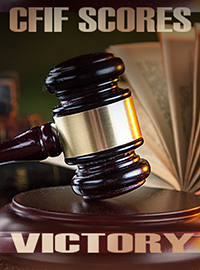| CFIF Scores Victory in Campaign Finance Case |
 |
|
By Jeff Mazzella
Tuesday, February 02 2016 |
On January 21, 2016, a three-judge panel on the U.S. Court of Appeals for the D.C. Circuit unanimously ruled in favor of the Center for Individual Freedom (“CFIF”) in Van Hollen v. FEC, a campaign finance case addressing free speech and compelled disclosure. The decision marks the second time in the case that the Court of Appeals reversed a decision by District Court Judge Amy Berman Jackson, who twice struck down a Federal Election Commission (“FEC”) rule requiring non-profit organizations that spend more than $10,000 per year on electioneering communications to disclose only donors who give “for the purpose of furthering electioneering communications.” Congressman Christopher Van Hollen (D-Maryland) brought suit against the FEC, hoping to force organizations engaged in electioneering communications to disclose all donors who contribute over a certain amount, regardless of whether they intended for their donations to fund such speech. Anticipating that the FEC, due to its split membership, might not appeal any adverse decision at the district court level, CFIF intervened to protect free speech interests and to preserve a right to appeal. The Court of Appeals’ decision, authored by Judge Janice Rogers Brown and joined by Judges David Sentelle and Raymond Randolph, reversed the district court and upheld the FEC rule as being consistent with the requirements of Chevron and the Administrative Procedure Act. The court also acknowledged the burdens that compelled disclosure impose on free speech and association guaranteed by the First Amendment. “By affixing a purpose requirement on BCRA’s disclosure provision, the FEC exercised its unique prerogative to safeguard the First Amendment when implementing its congressional directives,” wrote Judge Brown. “Its tailoring was an able attempt to balance the competing values that lie at the heart of campaign finance law.” CFIF was represented in the case by Thomas W. Kirby, Jan Witold Baran, Caleb P. Burns and Samuel B. Gedge of Wiley Rein, LLP. To read the full entire D.C. Circuit Court decision, click here. |
























